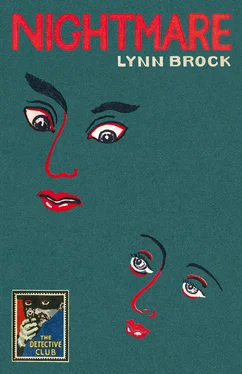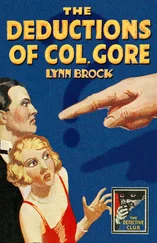‘They all have a go at it, sir, I reckon. But it’s that brazen young trollop of a maid of theirs that does most of it. I hear her running out of her kitchen to start it up when it stops.’
‘Why hear her, Hopgood?’ asked Mr Knayle soothingly. ‘Or it? I don’t.’
‘You may say you don’t, sir—but you do. How can you get away from it, with the noise coming down through the well of the staircase like through a flue? I believe they’ve put the gramophone right over it, on purpose.’ Hopgood’s voice, approaching now its real purpose, invested itself with respectful reproach. ‘I wonder you don’t make a complaint to the landlord, sir. It’s disgraceful that a quiet gentleman like you should be worried this way from morning to night. The fiddle was bad enough by itself; but this—well, it’s sheer torture, sir, that’s what it is, sheer downright, cold-blooded torture. Any other gentleman would have complained long ago.’
But, while he surveyed his completed toilette in a long glass critically, Mr Knayle put a kindly foot upon this attempt to stampede him, and scotched it firmly.
‘Never allow yourself to be worried, Hopgood. And never, never let other people know that they can worry you. I admit that the same tune played fourteen hundred times begins to pall a little. But it might have been played twenty-four hundred times. The sound is hardly audible down here—unless you listen for it. Let us console ourselves by the reflection that other people are having a much worse time of it than we are. A great help, that—always.’ He looked towards the windows. ‘Yes, there’s the rain. I had better get off, I think. Has Chidgey brought the car round?’
As Mr Knayle drove off in his smart coupé to spend the afternoon with his friends, the Edwarde-Lewins, he glanced up casually towards the first floor. But there was nothing to see there. Perceiving a showy-looking young woman in coquettish apron and cap standing at one of the windows of the top flat smoking a cigarette, he smiled. The lease of his own flat would expire in September, and he had all but decided, before falling asleep that afternoon, to write that evening to the landlord giving him the agreed three months’ notice that his tenancy would not be renewed. He would be away for the greater part of those three months, so that the persistency of the Prossips’ gramophone, which, he was resolved, should not trouble him in the least, was of no concern to him.
He was quite determined that it should not trouble him in the least. During the past few months, he had noticed, a lot of people whom he knew—quite good-tempered, placid people, formerly—had developed a marked tendency to allow little things to worry them and make them irritable. He had noticed in himself a tendency to attach too much importance to trifling annoyances—a lost golf-ball, or a dud razor-blade, or a little tactlessness on the part of a friend—and had occasionally found it necessary to check it with some firmness. He assured himself now, therefore, that though stupid and childish and, of course, annoying for Mr and Mrs Whalley (a pity, though, that Whalley should allow himself to take it so seriously) the dogged perseverance of the Prossips’ gramophone struck him as rather amusing.
As, of course, it was.
Seated beside Mr Knayle, his chauffeur, Chidgey, had also glanced up to the windows of the top flat and smiled faintly. He knew all about the Prossips’ gramophone and thought it a game. His smile faded almost at once, however, and his rather pleasant face became gloomy. The gear-box and the back-axle of the car should both have been refilled last week. He had not refilled them last week, nor since. He couldn’t explain to himself why he hadn’t, except that it was a messy job and that he had felt disinclined to do it. He had been with Mr Knayle for three years and had always taken anxious care of the two new cars which his employer had acquired in that time. It worried him that he had had this funny feeling lately that he didn’t want to do jobs about the car that were a bit troublesome and messy—a sort of feeling that it wasn’t worth bothering about doing them.
At all events Agatha Judd—the brazen young trollop of the top flat—was quite sure that the gramophone’s persistency was amusing—the most priceless lark, in fact, that had so far diverted her light-hearted existence.
As Mr Knayle’s car disappeared from her view round the curve of Downview Road, once more the gramophone blared triumphantly the long-drawn closing note of ‘I can’t give you anything but love, Baby’. The needle slid off the record and the abrupt succeeding silence aroused her from her never-wearying contemplation of the passing traffic. But the disturbance caused her no resentment, though for two hours past, without intermission, at intervals of a few minutes, precisely similar disturbances had called her away from her window. Jamming a cigarette between her full, bedaubed lips, she flitted with hurrying eagerness out of the kitchen and along the little central corridor of the flat to where the gramophone stood on a small landing or platform at one side of the three steps descending from the corridor to the hall-door. Having started the needle once again upon its pilgrimage over the worn record, she wound up the instrument recklessly and then stood for some moments listening, her bold hazel eyes narrowed to exclude the smoke of her cigarette.
She was a slim, shapely girl of twenty-four or five and, despite her hardy allure, her powdered skin, and her salved lips, a noticeably good-looking young creature, obsessed by her own personal appearance, inefficient and lazy, equipped with the mentality of a Dunpool slum-child of ten, and possessed by a never-flagging determination to extract a bit of fun from life. At that moment, as has been said, despite the unavoidable monotony of the means, she was extracting a quite satisfying bit of it. As she stood listening, blissfully unaware of the grim fate whose scissors were already opening above her sleek little head, she smiled with vivid pleasure.
Stooping to the gramophone again—it rested on the bare boards of the little landing, whose carpet had been rolled back—she laid a finger against the edge of the record, increasing and relaxing its pressure alternately. The melody dissolved into hideous ululations, wailing and howling in dolorous insanity. She laughed softly while she continued this manipulation for a minute or so and then climbed over the balusters—relics of the former interior staircase of the house, removed at the time of the conversion—which enclosed the landing on two sides. Bracing herself, she sprang into the air and descended upon the boards with her full weight. The hollow, echoing reverberations which resulted—for the flooring beneath her high-heeled shoes consisted merely of match-boarding—widened her smile. She reproduced it with deliberation half a dozen times, then wound up the gramophone again, restarted the needle, climbed back over the balusters and, crossing the passage, entered the flat’s sitting-room.
In there Marjory Prossip, a heavily-built, sullen-faced young woman of thirty, sat bent over the construction of a silk underskirt. She turned her large, elaborately-waved head as Agatha entered and rose silently from her chair. For a moment of preparation the two faced one another in the middle of the room, then, together, they sprang ceilingward and descended upon the carpet with a violence which set the windows a-rattle. This athletic feat having been repeated several times, Miss Prossip reseated herself with her work and Agatha returned humming to the kitchen, pausing along the way to start the gramophone once more. No word had passed between them. Agatha had not troubled to remove her cigarette from her lips.
Читать дальше












